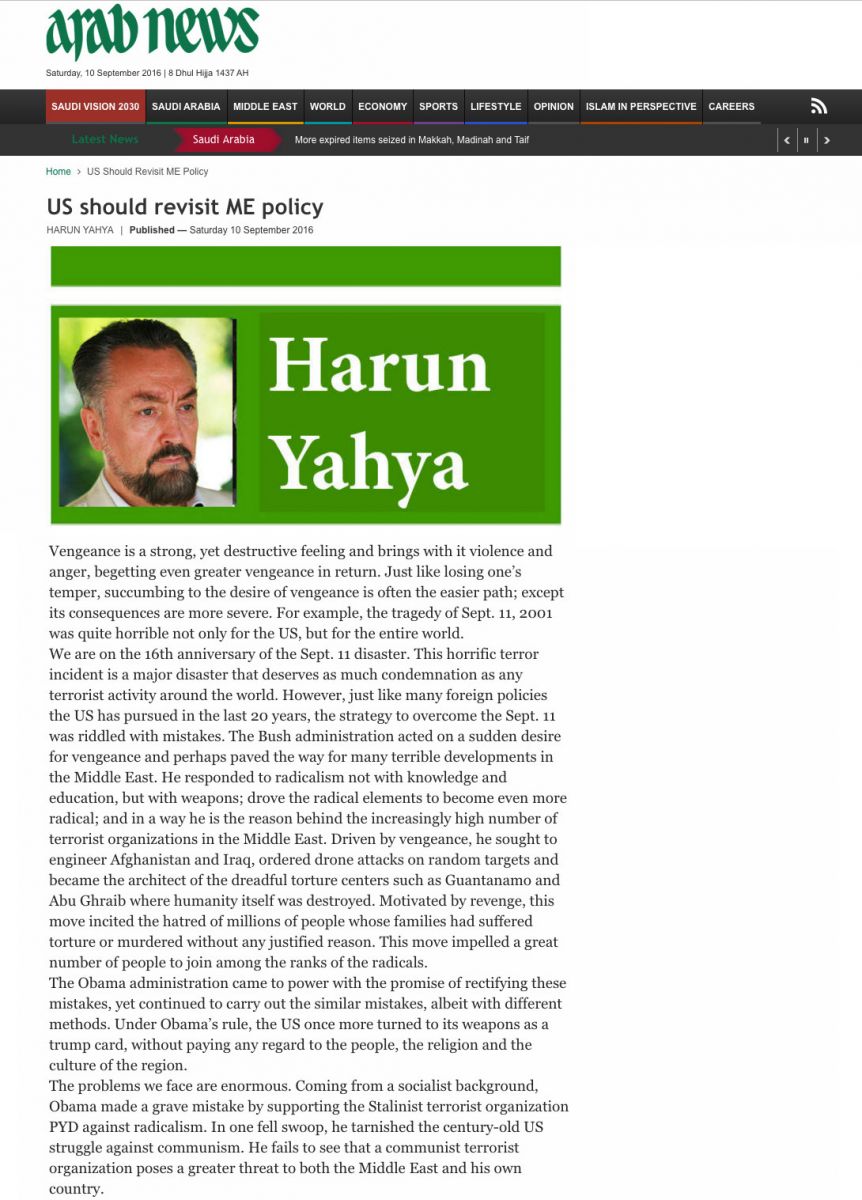
Vengeance is a strong, yet destructive feeling and brings with it violence and anger, begetting even greater vengeance in return. Just like losing one’s temper, succumbing to the desire of vengeance is often the easier path; except its consequences are more severe. For example, the tragedy of Sept. 11, 2001 was quite horrible not only for the US, but for the entire world.
We are on the 16th anniversary of the Sept. 11 disaster. This horrific terror incident is a major disaster that deserves as much condemnation as any terrorist activity around the world. However, just like many foreign policies the US has pursued in the last 20 years, the strategy to overcome the Sept. 11 was riddled with mistakes. The Bush administration acted on a sudden desire for vengeance and perhaps paved the way for many terrible developments in the Middle East. He responded to radicalism not with knowledge and education, but with weapons; drove the radical elements to become even more radical; and in a way he is the reason behind the increasingly high number of terrorist organizations in the Middle East. Driven by vengeance, he sought to engineer Afghanistan and Iraq, ordered drone attacks on random targets and became the architect of the dreadful torture centers such as Guantanamo and Abu Ghraib where humanity itself was destroyed. Motivated by revenge, this move incited the hatred of millions of people whose families had suffered torture or murdered without any justified reason. This move impelled a great number of people to join among the ranks of the radicals.
The Obama administration came to power with the promise of rectifying these mistakes, yet continued to carry out the similar mistakes, albeit with different methods. Under Obama’s rule, the US once more turned to its weapons as a trump card, without paying any regard to the people, the religion and the culture of the region.
The problems we face are enormous. Coming from a socialist background, Obama made a grave mistake by supporting the Stalinist terrorist organization PYD against radicalism. In one fell swoop, he tarnished the century-old US struggle against communism. He fails to see that a communist terrorist organization poses a greater threat to both the Middle East and his own country.
On Sept. 11, the US should revise in depth its Middle East policy that has been in development since 2001 and approach the subject with self-criticism. The sense of revenge has led US, Europe and the Gulf region to their ruin. The right course of action for the US to follow is not to insist on politics; instead, it must adopt a rationalistic and compassionate policy.
Institutions and think-tanks that have been steering the Middle East policies are well-known. The same strategies and the same mistakes. Therefore, it is crucial for US to focus on different insights, to pay heed to the circles that are familiar with the spirit of this region and to act in cooperation with these circles.
Similarly, the US always gives prominence to the counsel of certain England-based US institutions and NGOs concerning its strategies. However, the foreign policy devised by these institutions only serves the interests of the English deep state; not US. Therefore, US should carefully consider the fact that its actions serve the interest of a devious deep state system, whether knowingly or unknowingly. If US genuinely wishes to be a supporter of democracy in the Middle East, it should discard the interests of the deep states and adopt a rationalistic educational, incentive and re-conciliatory policy.
The Greater Middle East Project has been largely unmasked. It earned hatred of the Middle East with the exempt of communist organizations. And today, it has become more evident that Turkey and Russia will never allow such a project to be materialized. The attempt to forcefully redesign the region will further fuel anti-Americanism and in no way will it bring about the long-awaited democracy. The most accurate course of action the mostly Christian American society should take is to draw up strategies that give prominence to love and peace, the fundamental tenets of Christianity, which will definitely bring many blessings. The Middle East policy cannot be shaped by the analyzes of the individuals who try to look down on, and determined to depreciate and annihilate the Middle East nations from their keyboards. The region is the land of prophets; it is a precious geography inhabited by the progeny of prophets and ethnicities each more valuable than the other. To be able to reach accurate diagnoses and offer precise guidance regarding the Middle East, first of all one must be quite familiar with the values of the true Islam that is based on the Qur’an, and introduce these moral values through a viable strategy. When the American foreign policy experts take this into consideration, they will immediately realize that what the Middle East needs are not war and revenge, but love and a proper Islamic conception.
Democracy and the sense of liberty will surely suit the Middle East. However, this should be accomplished through a viable strategy and by winning the hearts of the people. The previous policies largely alienated the people of the region from the US. We hope that the newly elected president of the US will adopt a policy of education and love that will help win over the Middle East and its people.
0 comments:
Post a Comment